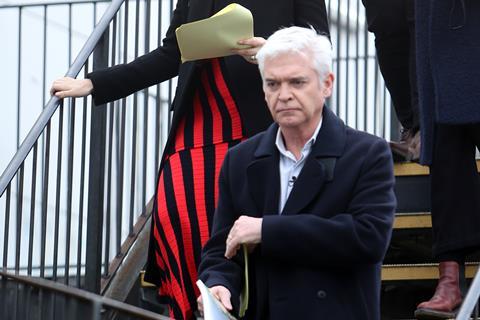In the court of public opinion there is rarely room for forgiveness or redemption, observes Tim Farron MP

As Phillip Schofield exits This Morning, I think we should pray for a resolution to all the anger, remorse and hurt being played out in the UK media right now.
The ongoing saga has led me to reflect on how the abuse and misuse of power in relationships is repeatedly seen in public life. This is true of the entertainment industry, politics, sport and the Church – in fact, every institution where humans are placed on a pedestal, revered for a while and then torn down when they prove to have feet of clay.
Forgiveness and grace are potent antidotes to the abuse of power, and we can only find these in Jesus
In our post modern culture, power is key. All truth claims are considered to be linked to the desire to obtain and maintain control over others – economically, politically and socially. In this world, individuals need to fight for their rights against the oppression of the ‘elites’ who wield the power.
Power and grace
The media takes delight in exposing and deposing those who step out of line; using its own power to destroy careers and reputations. Injustices should, of course, be exposed and put right. But in the court of public opinion, even where there is genuine remorse, there is rarely room for forgiveness or redemption.
Our culture encourages us to be glowering Pharisees, strangers to grace.
Those who are given a public voice, who thrive on respect and adulation – whether they are MPs, church leaders or television presenters – should understand that they must tread lightly. Being cast out into the wilderness can be swift and brutal.
It’s entirely possible – as Phillip Schofield claims – that those who have power and influence do not always fully recognise the effect that their actions have on those lower down the hierarchy. It is possible, but it is not an excuse.
But others clearly misuse their authority quite deliberately to intimidate, bully and abuse others. For those proven guilty of abuse, justice should be done.
An intoxicating mix
Power and ‘celebrity’ can be intoxicating - and dangerous for those who hold it. Social media has only exacerbated this trend. American commentator, Bonnie Kristian, believes that constant access to a public platform (which effectively now includes all of us) leads to a misplaced sense of self-importance and grandiosity, where “the constant invitation to air our views can deceive us about their quality and importance.”
What a brutal but accurate summary of the state of our discourse.
In this context, the Christian faith can give us a real dose of perspective. While human hierarchy raises some up and pushes others down, we are all equal in the eyes of God. Nobody is worthier or more important than anyone else, because we are all made in God’s image and deeply loved by him.
Yet at the same time, we are all equally incapable of redeeming ourselves, no matter how much power and influence we may exercise on earth. This recognition should humble even the mightiest leader.
Real relationships
At the heart of God’s story is not power but relationship. He designed us to live in perfect relationship with himself and one another. But since we all fail to do this every day, we need his grace and redemption, achieved for us through Jesus’s sacrifice on the cross.
Loving our neighbour means we are supposed to put others first, to promote their interests, rather than wielding control over those who have less power than we do.
Humans have always failed at this in our own strength. The Bible is full of abuses of power and relationship, often but not always involving sex. See Potiphar’s wife and Joseph (Genesis 39); King David and Bathsheba (2 Samuel 11-12); the first century churches to whom Paul writes stern letters.
Our culture encourages us to be glowering Pharisees, strangers to grace
But Jesus taught us how to model right relationships. His story of the rich man and Lazarus, recounted in Luke 16, is an eye-opening warning to those who abuse their earthly power without remorse. Too engrossed in his own wealth and importance, the rich man gave no thought to the beggar at his gate. But the tables were turned after death.
Forgiveness and grace are potent antidotes to the abuse of power, and we can only find these in Jesus.
So let’s pray today for all those who enjoy positions of influence, and for those who have fallen from them; for integrity in public life across all sectors.
Let’s pray for forgiveness and healing for those caught up in current scandals, and that those involved may turn to Jesus and know that all is not lost.
Whatever our position on earth, we are each offered a great and enduring hope that lasts beyond worldly fame.






































No comments yet